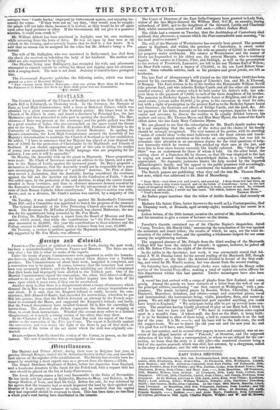ffortign an (Colonial.
FftaxcE.—The subject of political di.cussion in Paris, during the past week, has been a misunderstanding between France and Morocco. The facts are not very clear ; but this is what we make of the reports. Under the treaty of peace, Commissioners were appointed to settle the bounda- ries between Algeria and Morocco, as they existed when Algiers was a Turkish province. The Commissioners set about their work, imagined it completed, and a convention was to be signed. It seems, however, that the boundary had never been very accurately defined; and the Kabyles inhabiting one district complained that their lands had improperly been allotted to the Turkish part. One of the Moorish Commissioners signed the convention; the other, Sidi-Ahmed-el-Kader, refused to do so; and the matter rests for farther inquiry into the facts of the case; upon which it must turn, if they can be ascertained.
Another story is, that there is a disagreement about a treaty of commerce which General De la Rue was commissioned to negotiate; and strange imputations are cast about. It is said, that the Emperor refused to ratify, because his com- missioner, Sidi-Abmed-el-Kader, had exceeded his instructions, wherefore he put Sell into prison; then, that the British detected an attempt by the French nego- tiator to overreach the Moors, and suggested the Emperor's refusal; and lastly, that the French Government have recalled General De is Riie for exceeding his instructions. The Journal des Debats represents the General as stopping at Oran, to await fresh instructions. Whether this second story refers to a distinct disagreement, or is merely a wrong version of the other, time may show. In the Chamber of Peers, on Friday, Count Roy read the report of the Com- mittee on the conversion of the Five per Cents. fhe report is decidedly against the conversion; and even denies the right of the State to pay off that stock, in consequence of the terms of the act wider which the debt was originally con-
Spain.-.-Queen Isabella closed the session of the Cortes, in person, on the 284 instant. The new Constitution was promulgated on the same day.


























 Previous page
Previous page